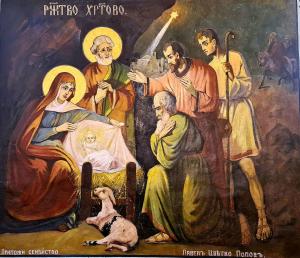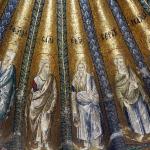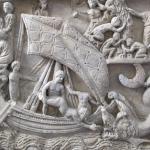
Christ is Born! Glorify Him!
We can become so used to historical, or even, dogmatic facts, that we confuse their rote memorization and the acceptance of them as fact as the same thing as understanding them and believing all they imply. This has led us to lose sight of the questions which can arise, for we tend to reduce everything to the simplified fact, saying if you accept the fact, you accept the truth and all that we believe is implied by the fact. Facts are not the same thing as the truth, and the accumulation of facts must not be confused with the acquisition of truth. Truth can be pointed to by facts, when interpreted properly, but again, many who hold various facts can and will use them to deny the greater truth. This is why, while it can be helpful to have people learn facts, we must not stop there, for then we would not ponder their meaning and value for our lives. If we confuse the memorization of facts as what entails a rich faith, we turn faith into something so banal, it should not be surprising we end up losing interest in it.
What does it mean for us to say God became human, and indeed, a man? What does it mean for God to be human? Both of these questions can, and should, lead us to see the complexities which lay behind apparently simple statements of fact. How does God become anything? Does God’s becoming human indicate some sort of change in God? Does it mean the divine nature itself changed, so that in relation to the incarnate God-man, the person is no longer God? Theologically, these questions arose, leading to all kinds of debates; eventually, a rather open-ended answer emerged at the Council of Chalcedon, indicating all the facts which should be upheld without trying to say too much and be led astray. Chalcedon says that God the Son, the Logos, assumed human nature while keeping the divinity intact, so that the Logos is one person who has two natures, one the unchanging divine nature, the other, human nature. If we talk about change, due to the way the Logos became human, such “change” is not an indication of change in the divine nature for the divine nature does not change. Instead, it is best understood in relation to our engagement with God, where there is a time in which Jesus has not yet been born, and then a time after which Christ had been born, indicating, a time before we experience the incarnation and a time after we experience it. We can also say, due to the fact that the Logos assumed human nature, in accordance to that nature, there is change, as humanity is tied to and connected with history, where change is constant. In the end, as Chalcedon hints, our words used to discuss the incarnation end up rather paradoxical, as we accept in the divine person of the Logos, with the divine nature, there is no change, and yet assumed to that person is a human nature which changes.
It is not just the question of how we interpret the assumption of human nature by the Logos, that is, how we can understand the Logos assumed something without there being some sort of change connected to Logos thanks to that assumption, which leads us to develop our understanding of the Christian faith, it is also the examination of what it means to be human which likewise will lead us to new questions which can and will enrich our faith. When we look at history, we will see different understandings of what “humanity” is and is not. Each time there is a different understanding of humanity, the teaching (which is dogmatic) will take on a new, and different meaning. Today, our scientific knowledge, both in relation to human biology, but also in relation to evolution and what it tells of human history and the connection humanity has with all other life on Earth, presents a far different picture of what it means to be “human” than was classically understood, and this means, our understanding of what it means for Jesus to become human will be different to what Christians in other eras believed and understood by this dogmatic declaration.
In earlier ages, humanity was seen as separate and distinct from the rest of life on Earth. Humanity could be said to be connected with the rest of creation due to the fact that all created beings shared the quality of being created in common, giving them a “created nature” which could allow them to be united as one. With evolution, we now see that such a sharp distinction between humanity and the rest of biological life on Earth is no longer tenable – we are connected together, forming one continuum of life, one large family tree; we can still be seen to be different, as there is something which makes humanity, human, and distinct from other life forms in the family tree of life, and so we still can try to find and discern the existence of some sort of “human nature,” but we can’t use that nature to completely isolate ourselves from all other forms of life. We are related to all other life. When God took on humanity, God took on that connection, that relationship which humanity has with all other life, meaning, in and through the assumption of humanity, God also is connected with all biological life on Earth.
Our understanding what it is to be human, and the potentiality found in humanity, has so radically changed, our reflection of Jesus must reflect those changes. Most of us will not even consider that our changed perspective has made our understanding of dogma different from those in the past; the words remain the same, the dogma doesn’t change, so we assume the understanding hasn’t changed as well. But it has, and though it is not a change in the dogma, in one sense, as the words remain the same, in another sense, as our understanding of the dogma changes, there is a change. And this is true for so many dogmas of the Christian faith. Our growing understanding of the world around us will require us to consider the implications of our new understanding and what it means when we have them interact with our dogmas. It is foolish to think nothing changes. The principles might remain the same, but the application and conclusions which emerge will change, which is why the results of our moral considerations might change as a result of our growing scientific knowledge.
Christ is born. God became human, indeed, a man. We recognize this. All of Christianity recognizes this and gives God glory for what God has done. But we don’t truly comprehend it, and indeed, we can’t, because much of it is all about God and God absolutely incomprehensible to us. We can and should recognize the value of the statement, as it points to what is absolutely fundamental to the Christian faith, and yet we must let the mystery which lies behind it remain, lest we make Christianity banal, and without the mystery of the faith, people end up becoming bored and not understanding why any of its teachings have value to their ordinary, daily lives.
Stay in touch! Like A Little Bit of Nothing on Facebook.
If you liked what you read, please consider sharing it with your friends and family!
N.B.: While I read comments to moderate them, I rarely respond to them. If I don’t respond to your comment directly, don’t assume I am unthankful for it. I appreciate it. But I want readers to feel free to ask questions, and hopefully, dialogue with each other. I have shared what I wanted to say, though some responses will get a brief reply by me, or, if I find it interesting and something I can engage fully, as the foundation for another post. I have had many posts inspired or improved upon thanks to my readers.













